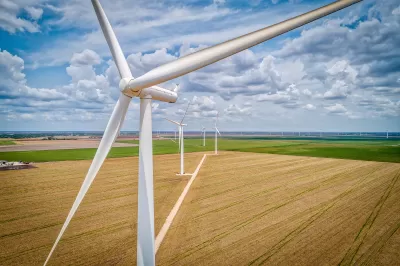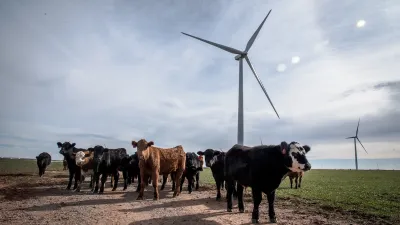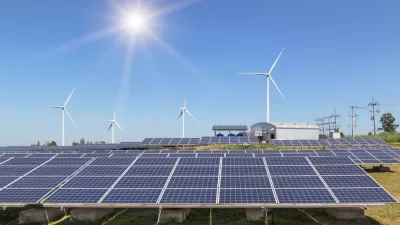The 184-megawatt wind project will help supply power to Amazon’s growing data center operations and logistics hubs in the region.

“Wind energy development has long been stuck in the doldrums in the southeastern United States,” writes Maria Gallucci in an article for Canary Media, where until last month, nine states — Alabama, Arkansas, Florida, Georgia, Kentucky, Louisiana, Mississippi, South Carolina, and Virginia — had installed zero megawatts of commercial wind capacity. Mississippi has broken from those ranks, with the state officially marking the opening of its first utility-scale wind farm in mid-June.
“Wind projects have historically struggled to take off in the U.S. Southeast for a few key reasons, including political opposition and a lack of favorable state renewable energy policies,” Gallucci reports. Another reason is lower wind speeds at low altitudes, which the project offsets by using taller, more powerful turbines. “The Delta wind project is using Vestas turbines with blades that can, at their highest point, reach 692 feet — making them the tallest onshore turbines in the country.”
The 41-turbine, 184-megawatt wind project is located on 14,000 acres of farmland in the northwestern corner of the state, which will continue to produce rice, soybeans, corn, and wheat around the turbines, a practice that isn’t new to wind farms but that is currently being explored as a way to make land use for another type of renewable energy, solar, more efficient as the concerns about solar panels taking valuable farmland out of production are growing.
Gallucci reports that a portion of the power produced by the new wind farm will be purchased by Amazon, which plans to build two data center complexes in the state and is backing 30 wind and solar projects across the Southeast. Data centers are notorious for consumption of resources, including electricity and water, and that demand will only rise as the use of AI — and any future novel technologies — grows.
FULL STORY: Mississippi just got its first utility-scale wind farm

Alabama: Trump Terminates Settlements for Black Communities Harmed By Raw Sewage
Trump deemed the landmark civil rights agreement “illegal DEI and environmental justice policy.”

Planetizen Federal Action Tracker
A weekly monitor of how Trump’s orders and actions are impacting planners and planning in America.

The 120 Year Old Tiny Home Villages That Sheltered San Francisco’s Earthquake Refugees
More than a century ago, San Francisco mobilized to house thousands of residents displaced by the 1906 earthquake. Could their strategy offer a model for the present?

Indy Neighborhood Group Builds Temporary Multi-Use Path
Community members, aided in part by funding from the city, repurposed a vehicle lane to create a protected bike and pedestrian path for the summer season.

Congestion Pricing Drops Holland Tunnel Delays by 65 Percent
New York City’s contentious tolling program has yielded improved traffic and roughly $100 million in revenue for the MTA.

In Both Crashes and Crime, Public Transportation is Far Safer than Driving
Contrary to popular assumptions, public transportation has far lower crash and crime rates than automobile travel. For safer communities, improve and encourage transit travel.
Urban Design for Planners 1: Software Tools
This six-course series explores essential urban design concepts using open source software and equips planners with the tools they need to participate fully in the urban design process.
Planning for Universal Design
Learn the tools for implementing Universal Design in planning regulations.
Clanton & Associates, Inc.
Jessamine County Fiscal Court
Institute for Housing and Urban Development Studies (IHS)
City of Grandview
Harvard GSD Executive Education
Toledo-Lucas County Plan Commissions
Salt Lake City
NYU Wagner Graduate School of Public Service





























